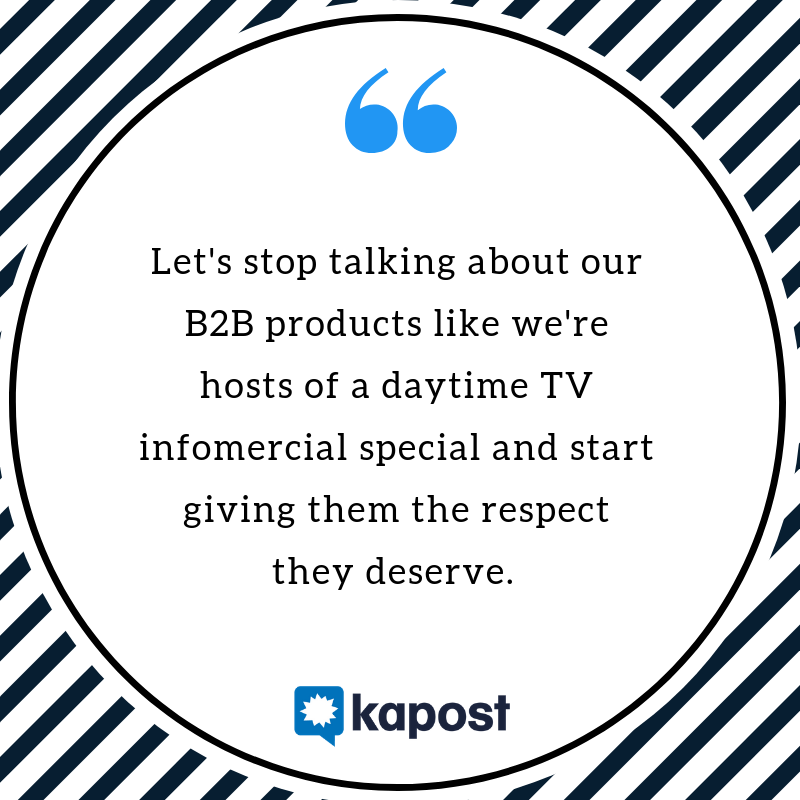I’m not ashamed to admit it: I’m a podcast fiend. I listen on my way to and from work, while I work out, when I do the dishes—the list goes on. Logging all these hours means I’ve heard a whole lot of ads—and since every podcast seems to be sponsored by the same 15 companies, I’ve heard each these ads a whole lot of times. The products hawked vary from toothbrushes to discounted business travel, but at their core, every advertisement is selling the exact same thing: simplicity.
Why figure out what to cook when you can get a meal kit in the mail? Why buy stamps at the Post Office when you can print them at home? It only takes two taps—just two!—to buy event tickets using this mobile app! Are these products any good? Sure, say the advertisers. But more importantly, they’re easy.
E-commerce startups weren’t the first companies to embrace ease-of-use as their primary value proposition—just look at any 1950s kitchen appliance ad featuring a beaming housewife—and they certainly won’t be the last. But more and more, I see this strategy being employed in a realm it shouldn’t be.
Fellow B2B marketers and sales folks, I’m looking at you.
The Difference between B2C and B2B Marketing Solutions
Everywhere I look, I see B2B solutions positioned this way—as time-savers and life-simplers. But I don’t want to know why your product is easy to use. I want to know why it’s so important that I can’t afford to live without it.
Unlike many of our B2C counterparts, our products aren’t simple. That’s because the problems we solve aren’t simple. We’re doing more than sending someone a new pack of razor blades in the mail, and that, in my humble opinion, is what makes our jobs so interesting.
Ready? Here’s my pitch:

Because positioning our companies’ products as quick and easy wins might be enticing in the short-term, but doing so will ultimately set ourselves—and our customers—up for failure.
Still skeptical? Here are three reasons why you should stop selling simplicity and start embracing the complexity of the problems your company solves:
1. You’ll Stand Out from the Crowd
As we B2B marketers struggle to gain credibility with audiences that take everything we say with a grain of salt, it’s tempting to fall back on a fad, diet-style advertising message, claiming that our product will single-handedly transform their professional lives—and that all they need to do is fork over the cash.
But when was the last time you bought a fitness solution from an infomercial just because it claimed you’d never have to exercise and showed some seriously incredible before-and-after photos of flabby stomachs turned lean? Never? That’s because you (rightly) assumed that what you were hearing was simply too good to be true.
So instead of jostling with competitors to be the quickest fix on the market, take the opportunity to stand out by being the only company willing to talk to prospects frankly about the complexity of their challenges.
Here at Kapost, for example, it would be easy to nod along when prospects call up claiming that all they need to be better marketers is a dynamic editorial calendar. Instead, however, we challenge that assumption, because we know that B2B marketing teams don’t just need efficiency-increasing point solutions to see success in the Age of the Customer—they need a new operating model. This honesty sets us up to have much more interesting conversations with prospects than they might be having with some of our competitors.
It’s a harder message to sell, of course, but a commitment to telling it like it is leads me directly to point number two:
2. You’ll Produce Higher-Quality Leads
But, you might be thinking, the thing I market really is easy to install/set-up/run.
That may be true, but any investment in a tool or service—especially in the B2B world—is a commitment to change. It requires time and effort spent learning new processes (and unlearning ingrained ones), winning buy-in, and changing the way people work.
No matter how easy your offering may make things once it’s up and running, making a purchase will always be more difficult than sticking to the status quo.
That’s why you need to sell the importance of your solution—not just the simplicity of it. What unacceptable business risk will your prospect face if they don’t do things your way? What do they stand to gain? What makes your offering different?
Developing this kind of narrative is more challenging than sticking to the “with product X, doing Y is easier than ever before!” model, but it’s ultimately much more compelling to the subsection of your audience that is actually ready to buy.
By filling the top-of-the-funnel with content designed to shift people’s thinking rather than encourage unrealistic hopes, you’ll probably see a drop in MQLs. But the leads you do qualify will be much more effectively primed to have serious conversations with your sales team.
Your sales team will thank you, and eventually, your customer success and retention teams will too. Why? Because…
3. You’ll Reduce Churn
Getting a customer is one thing. Keeping them is another.
Reducing customer churn is a pretty big deal because it’s a heck of a lot more expensive to bring in a new customer than it is to keep an existing one.
That’s why it’s so important that customers are prepared to be change makers when they purchase your product. If marketing and sales have glossed over the complexity of learning and implementing a new tool, driving team adoption, and measuring results—not to mention, explaining why going through all this is ultimately worth it—your customers probably won’t be prepared to do what it takes to see results.
The Takeaway
Respect your customers. Tell them the truth about what you’re selling, what it will take to make it work, and why it’s worth the effort. If your offer is truly valuable, you’ll benefit from weeding out people on the hunt for a quick fix and honing in on those with the potential to be your biggest success stories.


